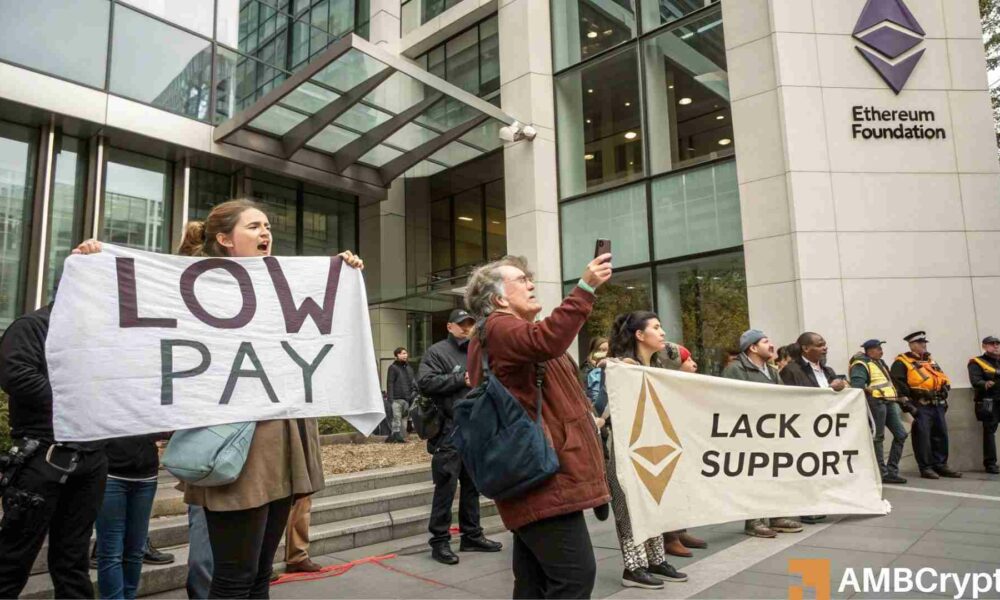Ethereum Foundation Criticism: A Deep Dive into Recent Community Backlash
The Ethereum Foundation (EF) has recently found itself under scrutiny, primarily due to accusations surrounding low pay and inadequate support for its community members. This backlash has raised questions about the Foundation’s alignment with the broader Ethereum ecosystem, especially as some prominent figures within the community voice their frustrations. This article explores the key aspects of the criticism faced by the EF, the ramifications for the Ethereum ecosystem, and the community’s sentiment surrounding these developments.
Key Accusations Against the Ethereum Foundation
Recently, the EF has been criticized for not providing sufficient support and compensation to its researchers and developers. The departure of long-standing EF researcher, Dankrad Feist, who transitioned to the Stripe-incubated Layer 1 blockchain called Tempo, served as a catalyst for these complaints. Observers noted that Feist’s move signaled underlying issues within the Foundation. The notable turnover of high-profile researchers has raised alarms about the EF’s ability to retain talent, a concern fueled by suggestions of paltry pay and an unsatisfactory work environment.
Misaligned Interests and Low Compensation
The dissatisfaction within the EF community is not limited to just a few disgruntled employees. Peter Szilagyi, a former lead developer at the EF, disclosed that he earned approximately $625,000 over six years, pre-tax. This figure has drawn ire from others in the blockchain space, who deem it far too low given his expertise. Comparatively, developers in other ecosystems, such as Solana, reportedly receive far more generous compensation. The resulting perception is that the EF is underselling its talent pool, exacerbating the ‘brain drain’ as developers seek better opportunities elsewhere.
Concerns Beyond Compensation: Community Support Issues
Internal dissatisfaction extends beyond mere salary disputes. Insiders have voiced concerns about a fundamental misalignment between the EF and key protocols. Sandeep Nailwal, CEO of Polygon, articulated his grievances starkly, alleging a lack of direct support from the EF for various Layer 2 projects. Nailwal emphasized that significant contributions to Ethereum from projects like the Polymarket are overlooked and go unrecognized by the wider Ethereum community. His statement about the community turning into a "shit show" underscored the depth of frustration within the ranks of developers and innovators working on Ethereum-lining projects.
The Need for Ecosystem Alignment
Despite a recent leadership overhaul by the EF aimed at realigning its priorities with community needs, many feel these changes have yet to meet expectations. This situation mirrors previous crises where community dissatisfaction prompted major shifts within the Foundation. Notably, Vitalik Buterin, co-founder of Ethereum, attempted to address concerns by publicly acknowledging the contributions of Polygon and its team. His support might signal a recognition that the EF must bolster its relationships with key players in the ecosystem to restore morale.
Market Impact and Future Outlook
As the community unrest unfolded, Ethereum’s market performance experienced a minor decline, with the price slipping slightly below $4,000. Still, sentiment around ETH remained neutral despite the ongoing turmoil within the EF. Analysts point out that community criticisms might not immediately impact market prices, but ignoring these voices could have longer-term repercussions as developers and researchers continue to leave the Foundation for better opportunities elsewhere.
Conclusion: A Call for Reform and Support
The criticisms aimed at the Ethereum Foundation raise significant questions about its governance and approach to supporting the community that drives its innovations. With an evident disconnect between the EF and various projects within the ecosystem, it becomes increasingly crucial for the Foundation to recalibrate its focus. Improved compensation, clearer communication, and enhanced support mechanisms could help the EF regain the trust and loyalty of its most vital contributors. As Ethereum continues to evolve, addressing these shortcomings will be essential for fostering a robust and thriving ecosystem.


